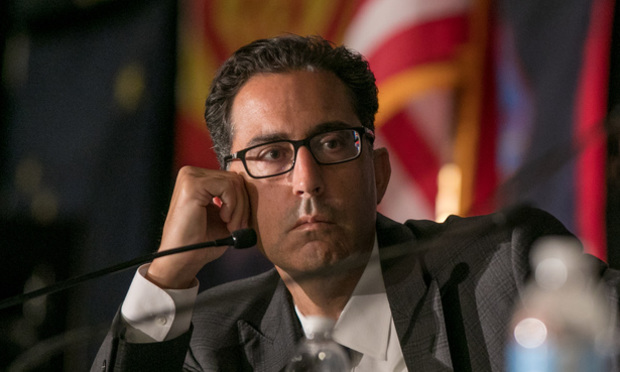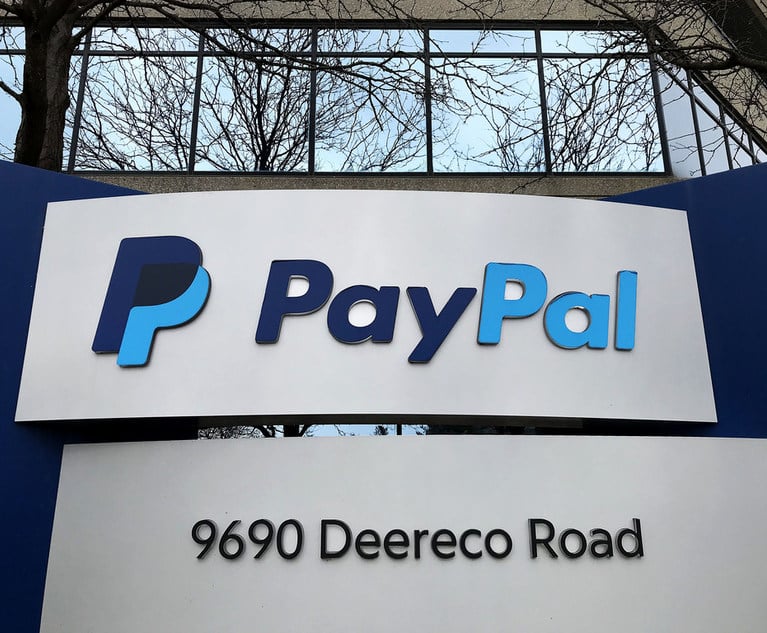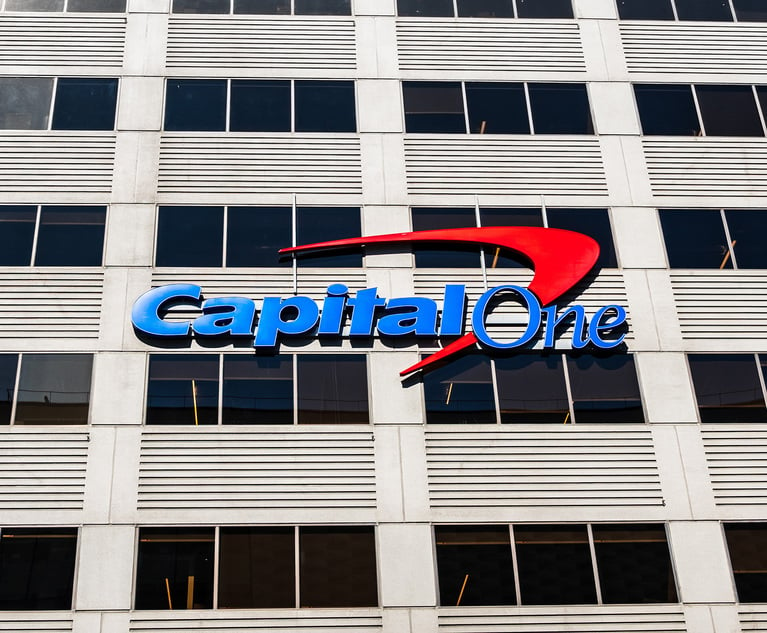Coinbase and Its 'New World' Come Back Before Judge Chhabria
Bitcoin Cash users are doubling down on insider trading allegations in their second amended complaint against cryptocurrency exchange platform Coinbase.
April 24, 2019 at 06:13 PM
3 minute read
 U.S. District Judge Vince Chhabria, Northern District of California. Photo: Jason Doiy/ALM
U.S. District Judge Vince Chhabria, Northern District of California. Photo: Jason Doiy/ALM
Coinbase will get a second at-bat this week as it attempts to avoid an insider trading lawsuit filed by investors over its currency exchange platform.
The investors' first attempt was thrown out by U.S. District Judge Vince Chhabria of the Northern District of California in October because the complaint did not provide a legal basis for its claims. The amended complaint, though, seeks to get past the initial hurdle by adding more plaintiffs and building on allegations that Coinbase intentionally lowered the price of bitcoin cash ahead of the launch to allow company insiders to reap the windfalls when its price reportedly surged 200 percent after trading began.
Thursday's hearing pits Robert Green of Green & Noblin and Lynda Grant of The Grant Law Firm for the investors against Coinbase's defense team from Keker, Van Nest & Peters.
Keker partner Steven Ragland declined to comment on behalf of his client. Lawyers for the plaintiffs didn't immediately respond to messages.
This amended complaint argues that Coinbase has not adequately dispelled reports of insider trading, nor answered why the company decided to launch the trading service without alerting the market beforehand.
The cryptocurrency traders cite the balance test in California's Unfair Competition Law to allege that Coinbase acted unfairly when it strayed from its promises to users to not roll out bug-ridden features compromising the marketplace, and failed to consider its own employees' “ulterior motives.”
The new complaint specifically claims Coinbase's purported conflicts of interest include functioning as a broker-dealer while making proprietary trades and allowing employees with access to customer information and currency listings to buy and sell on bitcoin cash platforms.
For those new to this saga, bitcoin cash was created last year in a so-called “hard fork” of the bitcoin blockchain—or the creation of a variant of the original software.
Chhabria was admittedly struggling to keep up with the case the first time around while still poking holes in the insider trading complaint for missing key details, like the actual basis for claims of insider trading. Keker's Ragland said during the hearing on Coinbase's prior motion to dismiss that the words “pump-and-dump” never appeared in the complaint, and that plaintiff's counsel were leveling all kinds of new claims inappropriately.
One thing to watch is whether Chhabria feels more comfortable in the world of blockchain and cryptocurrency his second time around.
“Intuitively, it seems like this is something that was bungled, but I don't know how well the complaint explains again why it was bungled and what the motivations were?” Chhabria said during that September hearing. “It may be because this is a new world, a new area that we judges don't know as much about as we know trading stocks at Charles Schwab.”
This content has been archived. It is available through our partners, LexisNexis® and Bloomberg Law.
To view this content, please continue to their sites.
Not a Lexis Subscriber?
Subscribe Now
Not a Bloomberg Law Subscriber?
Subscribe Now
NOT FOR REPRINT
© 2025 ALM Global, LLC, All Rights Reserved. Request academic re-use from www.copyright.com. All other uses, submit a request to [email protected]. For more information visit Asset & Logo Licensing.
You Might Like
View All
Litigation Trends to Watch From Law.com Radar: Suits Strike at DEI Policies, 'Meme Coins' and Infractions in Cannabis Labeling
4 minute read
Microsoft Becomes Latest Tech Company to Face Claims of Stealing Marketing Commissions From Influencers

PayPal Faces New Round of Claims; This Time Alleging Its 'Honey' Browser Extension Cheated Consumers

'Reverse Robin Hood': Capital One Swarmed With Class Actions Alleging Theft of Influencer Commissions in January
Trending Stories
Who Got The Work
J. Brugh Lower of Gibbons has entered an appearance for industrial equipment supplier Devco Corporation in a pending trademark infringement lawsuit. The suit, accusing the defendant of selling knock-off Graco products, was filed Dec. 18 in New Jersey District Court by Rivkin Radler on behalf of Graco Inc. and Graco Minnesota. The case, assigned to U.S. District Judge Zahid N. Quraishi, is 3:24-cv-11294, Graco Inc. et al v. Devco Corporation.
Who Got The Work
Rebecca Maller-Stein and Kent A. Yalowitz of Arnold & Porter Kaye Scholer have entered their appearances for Hanaco Venture Capital and its executives, Lior Prosor and David Frankel, in a pending securities lawsuit. The action, filed on Dec. 24 in New York Southern District Court by Zell, Aron & Co. on behalf of Goldeneye Advisors, accuses the defendants of negligently and fraudulently managing the plaintiff's $1 million investment. The case, assigned to U.S. District Judge Vernon S. Broderick, is 1:24-cv-09918, Goldeneye Advisors, LLC v. Hanaco Venture Capital, Ltd. et al.
Who Got The Work
Attorneys from A&O Shearman has stepped in as defense counsel for Toronto-Dominion Bank and other defendants in a pending securities class action. The suit, filed Dec. 11 in New York Southern District Court by Bleichmar Fonti & Auld, accuses the defendants of concealing the bank's 'pervasive' deficiencies in regards to its compliance with the Bank Secrecy Act and the quality of its anti-money laundering controls. The case, assigned to U.S. District Judge Arun Subramanian, is 1:24-cv-09445, Gonzalez v. The Toronto-Dominion Bank et al.
Who Got The Work
Crown Castle International, a Pennsylvania company providing shared communications infrastructure, has turned to Luke D. Wolf of Gordon Rees Scully Mansukhani to fend off a pending breach-of-contract lawsuit. The court action, filed Nov. 25 in Michigan Eastern District Court by Hooper Hathaway PC on behalf of The Town Residences LLC, accuses Crown Castle of failing to transfer approximately $30,000 in utility payments from T-Mobile in breach of a roof-top lease and assignment agreement. The case, assigned to U.S. District Judge Susan K. Declercq, is 2:24-cv-13131, The Town Residences LLC v. T-Mobile US, Inc. et al.
Who Got The Work
Wilfred P. Coronato and Daniel M. Schwartz of McCarter & English have stepped in as defense counsel to Electrolux Home Products Inc. in a pending product liability lawsuit. The court action, filed Nov. 26 in New York Eastern District Court by Poulos Lopiccolo PC and Nagel Rice LLP on behalf of David Stern, alleges that the defendant's refrigerators’ drawers and shelving repeatedly break and fall apart within months after purchase. The case, assigned to U.S. District Judge Joan M. Azrack, is 2:24-cv-08204, Stern v. Electrolux Home Products, Inc.
Featured Firms
Law Offices of Gary Martin Hays & Associates, P.C.
(470) 294-1674
Law Offices of Mark E. Salomone
(857) 444-6468
Smith & Hassler
(713) 739-1250






